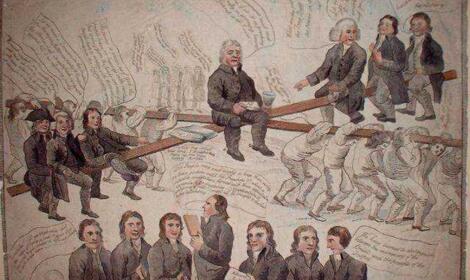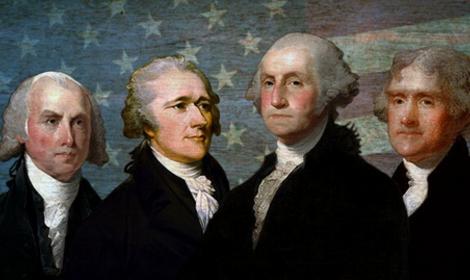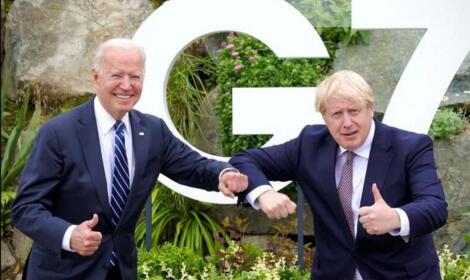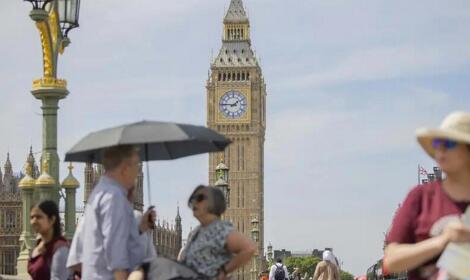QA问答:英国为什么要对华发动鸦片战争?
正文翻译
Carl Hamilton
M.S. in Geography & History, Roskilde University (Graduated 2021)Upvoted by
Jonathan Moore, lives in China (2014-present) and Thomas Smedley, PhD Communication & History, Regent University (2010)Jun 8
You could easily say British Imperialism, and be done with it, but I think you would miss out on what actually happened, and not learn much. There are some nuances to the Opium War which I find very interesting, as it is not a subject that is really even touched on much in European history education.
你可以很容易地说英国帝国主义,然后结束它,但我认为你会错过实际发生的事情,不会学到很多。鸦片战争有一些细微的差别,我觉得非常有趣,因为在欧洲历史教育中,这是一个没有触及太多的主题。

I think it is important to understand the situation of that the First Opium War occurred in. Let us start with the western point of view.
我认为了解第一次鸦片战争发生的情况很重要。让我们从西方的角度开始。
European nations (and the US) in general, but Britain in particular were invested in trade with China, almost exclusively through Guangzhou (referred to as Canton by British people at the time). Britain wanted tea from China, which at this point in time controlled nearly all of the world’s tea production. Great Britain had an almost unbelievable demand for tea, and export to other European countries were not bad either. The problem was that Qing China did not want to buy many western products. Instead they demanded payment in silver. For a while this was acceptable, but the Mexican War of Independence, lead to a shortage in high quality silver coins on a world scale.
一般来说,欧洲国家(和美国),尤其是英国,都在与中国进行贸易投资,几乎都是通过广州(当时英国人称之为广州)。英国希望从中国进口茶叶,因为当时中国几乎控制了世界上所有的茶叶生产。英国对茶叶的需求几乎令人难以置信,对其他欧洲国家的出口也不错。问题是清朝不想购买很多西方产品。相反,他们还要求用白银支付。在一段时间内,这是可以接受的,但墨西哥独立战争,导致高质量的银币在世界范围内短缺。
The British East India Company which owned Bengal in India at the time, wanted to fix the trade deficit with Qing. They did this by growing opium in Bengal, which was considered a medicine in the British Empire mind you and sold as laudanum, which they would then sell to Qing. Qing outlawed opium trade naturally, but the demand was so high that most officials in Guangzhou ignored it, and even during periods of crack down smugglers were eager to transport opium to the shores.
当时在印度、孟加拉的英国东印度公司想要弥补与清朝的贸易逆差。他们通过在孟加拉种植鸦片来做到这一点,鸦片在大英帝国被认为是一种药物,作为鸦片酊出售,然后卖给清朝。清朝自然取缔了鸦片贸易,但需求如此之大,以至于广州的大多数官员都不予理会,甚至在严打期间,走私者也急于将鸦片运往海岸。
From the Qing point of view things looked different, the tea, porcelain and silk trade were beneficial, the Qing economy was gigantic and the minting of high quality silver coins was essential at the time. The foreign trade for silver aided in this as the trade balance favored Qing. However, as the opium trade increased, silver began flooding out of Qing, causing economical problems, and also started an epidemic of opium addicts which further hurt people and the economy. Qing realized that this situation would eventually bankrupt the country, not to mention seriously hurt it’s people through addiction. From the Qing point of view western traders were often little more than glorified smugglers as they traded in illegal goods through illegal smuggler rings.
从清朝的角度来看,情况有所不同,茶叶、瓷器和丝绸贸易是有益的,清朝经济庞大,高质量银币的铸造在当时是必不可少的。由于贸易平衡有利于清朝,白银的对外贸易也起到了促进作用。然而,随着鸦片贸易的增加,白银开始大量流出清朝,造成了经济问题,也引发了鸦片吸食者的流行,进一步伤害了人民和经济。大清意识到这种情况最终会使国家破产,更不用说通过成瘾严重伤害它的人民。在清朝看来,西方商人通常不过是被美化了的走私者,他们通过非法走私团伙交易非法货物。
The first change that led to the Opium War came when the Lin Zexu was appointed as governor of Guangdong (where Guangzhou is). His mission was simply to stop the opium trade. Lin Zexu unlike many previous governors of the province was by all accounts, a highly morale man, well loved by many people, and considered incorruptible. Sticking to this reputation, Lin Zexu asked the British and others simply to stop the opium trade, and indeed wrote a public letter addressed to Queen Victoria. The letter is fascinating, and I highly recommend reading it here.
导致鸦片战争的第一个变化是林则徐被任命为广东(广州所在地)总督。他的任务只是阻止鸦片贸易。林则徐不像以前的省长,他是一个士气很高的人,深受人民爱戴,被认为是廉洁的。为了维护自己的声誉,林则徐要求英国和其他国家停止鸦片贸易,并确实给维多利亚女王写了一封公开信。这封信很吸引人,我强烈推荐去阅读。

大致翻译:
我大清皇帝对海外各国向来一视同仁。你对皇上历次进贡,以及感恩皇上对你们的公平对待,可见你也是深明大义、感激天恩的人。所以天朝对你也格外照顾,跟你们通商了二百多年。你们国家之所以富裕,是因为跟天朝通商的结果。可是现在有些商人,却带着鸦片,诱惑华人吸食。这种事情利己害人,天理不容。皇上听说以后非常生气,所以才派我来广东查禁。本想杀了这些商人,但念在这些商人还算诚实,全部上缴了鸦片,所以按自首,给他们一次改过自新的机会。今后再犯的,那只有严惩不贷。我相信你如此倾心向化,一定能管住这些商人,使他们不再违反天朝的法制。
听说你们国家离中国有六七万里,这么远还有这么多商人,可见贸易的利润多么惊人。你想想,本来这些利润都是天朝的,现在被你们分去,你们不感恩戴德,怎么可以再用毒品来残害华人?听说你们国家也在严禁鸦片,那就明知这是毒品,还来害人。你看看中国卖给你们是什么商品,茶叶、大黄、瓷器、丝绸,都是你们的生活必需品,如果我们不再卖给你们,你们怎么生存呢?你再看看你们卖给中国是什么东西,怀表钢琴,都是些玩物丧志的商品,可有可无。况且你们卖给中国的商品,已经赚了三倍的利润,怎么忍心再拿毒品残害中国人呢?
听说你宅心仁厚,自然不会用害人的东西卖给中国。我相信只是因为商船太多了,所以没有仔细检查。听说你们国内也不种植鸦片,都是在印度等地种植。从今往后,不要种了,把这些罂粟连根拔起,然后种些粮食,有敢再种的人,治他重罪,那就是干了一件大善事,老天爷会保佑你长命百岁,多子多孙。
这些商人来中国已经很长时间了,他们在英国时间少,在中国的时间多。所以他们应该遵守中国的法律。就好像别人到英国做生意,当然也要遵守英国的法律。现在中国规定吸食鸦片和贩卖鸦片的都要处死,可是英国人如果不带来,中国哪儿来的走私犯呢?杀人还要抵命,何况鸦片害了这么多人。义律说禁令太严格,请求宽限时间,说印度请给五个月时间,英国给十个月时间。这事我已经请示皇上了,皇上格外开恩,凡在一年六个月之内,误带鸦片来中国的,暂不问罪,只要把鸦片全部上缴就可以了。但要是过了这个期限,还来中国贩运,那就是明知故犯,那时候我天朝也算仁至义尽了。
我天朝统驭天下,不忍不教而诛,所以才明明白白地告诫你。如果你想长期贸易,就要遵守大清的法令,永远断绝鸦片来源,不要以身试法。皇上惩恶扬善,你才因此当上的国王,你要感激天恩,才能享太平之福。接到信件之后,赶紧杜绝鸦片来源,不要诿延。
Victoria did not respond, and Lin probably did not expect her to either. He moved on to more direct measures, starting with a crackdown on the Chinese smuggler rings and opium dens, confiscating tens of thousands of opium pipes as well as about 2,000 opium drug dealers. Lin then prevented the sale of opium, and so that western traders would not sell it elsewhere in China, he offered to exchange their entire stock of over 1 million kg of opium for tea. However, the British refused this and instead Lin resorted to threats.
维多利亚没有回答,林大概也没想到她会回答。他转而采取更直接的措施,首先是打击中国走私团伙和鸦片窝点,没收数万根鸦片烟管以及大约2000名鸦片毒贩。林阻止了鸦片的销售,为了不让西方商人在中国的其他地方销售鸦片,他提出用他们全部库存的100多万公斤鸦片来换取茶叶。然而,英国拒绝了这一点,而林采取威胁手段。
Back on the British side we must mention the British Charles Elliot, who was chief commissioner in Macau. It was his job to protect merchants in the area. It should be noted that Elliot was abhorred the opium trade. But also could not tolerate that the Qing government had confiscated billions worth of goods from British traders under threat, and with no compensation. The British trader mind you, were often bulk carriers which didn’t own all the goods, but sold them on behalf of others among many other goods. As such they would have broken contract if they gave up the opium to Lin voluntarily. A fact that Lin refused to recognize or negotiate on.
回到英国方面,我们必须提到英国人查尔斯·埃利奥特,他是澳门的首席专员。保护该地区的商人是他的工作。应该指出的是,埃利奥特憎恶鸦片贸易。但也不能容忍清政府在威胁下没收英国商人价值数十亿美元的货物,而且没有任何补偿。请注意,英国商人通常是散货船,他们并不拥有所有的货物,而是代表其他人出售货物。因此,如果他们自愿把鸦片交给林,他们就违反了合同。这是林拒绝承认和谈判的事实。
Elliot saw this as an insult to the British people, whom he suspected were considered inferior people by the Qing, which was not incorrect, as Lin personally referred to them as “mentally childlike” and the official Qing term was simply barbarians. Eventually, when Lin physically confiscated the opium stock and besieged the British factories, Elliot guaranteed that they would get compensated by the British government, and after this the British merchant fleet evacuated from Guangzhou to a rock called Hong Kong, where they would anchor. However, Lin refused to let British people trade as long as they didn’t sign a decree that they would never sell opium, which they refused.
埃利奥特认为这是对英国人民的侮辱,他怀疑英国人民被清朝视为低人一等的人,这并不正确,因为林则徐个人称他们为“精神幼稚”,而清朝的官方称谓直接说成是野蛮人。最终,当林则徐没收鸦片库存并包围英国工厂时,埃利奥特保证他们会得到英国政府的补偿,之后英国商人舰队从广州撤离到香港,他们将在那里停泊。然而,林则徐拒绝让英国人进行贸易,只要他们不签署永远不卖鸦片的法令,他们拒绝了。
While anchoring at Hong Kong two British sailors went to shore at Kowloon and beat to death an innocent Chinese villager. Lin demanded them exchanged to be punished (executed most likely) but Elliot refused saying that they had no deal with Qing about such legal exchanges, which was true, as Qing refused almost any treaty. Elliot did have the men arrested and offered Lin to be an observer at their trial which Lin refused. Elliot found the men guilty and sentenced them to fines, as well as prison labor in England for which they were shipped back (they did not serve the prison time).
在香港停泊时,两名英国水手在九龙上岸,打死了一名无辜的中国村民。林要求交换他们以惩罚(最有可能的是处决),但埃利奥特拒绝说,他们没有与清朝就这种法律交换达成协议,这是真的,因为清朝拒绝几乎任何条约。埃利奥特确实逮捕了这些人,并提出让林作为他们审判的观察员,但林拒绝了。埃利奥特发现这些人有罪,并判处他们罚款,以及他们被运回英国的监狱劳动(他们没有服刑)。
M.S. in Geography & History, Roskilde University (Graduated 2021)Upvoted by
Jonathan Moore, lives in China (2014-present) and Thomas Smedley, PhD Communication & History, Regent University (2010)Jun 8
You could easily say British Imperialism, and be done with it, but I think you would miss out on what actually happened, and not learn much. There are some nuances to the Opium War which I find very interesting, as it is not a subject that is really even touched on much in European history education.
你可以很容易地说英国帝国主义,然后结束它,但我认为你会错过实际发生的事情,不会学到很多。鸦片战争有一些细微的差别,我觉得非常有趣,因为在欧洲历史教育中,这是一个没有触及太多的主题。

I think it is important to understand the situation of that the First Opium War occurred in. Let us start with the western point of view.
我认为了解第一次鸦片战争发生的情况很重要。让我们从西方的角度开始。
European nations (and the US) in general, but Britain in particular were invested in trade with China, almost exclusively through Guangzhou (referred to as Canton by British people at the time). Britain wanted tea from China, which at this point in time controlled nearly all of the world’s tea production. Great Britain had an almost unbelievable demand for tea, and export to other European countries were not bad either. The problem was that Qing China did not want to buy many western products. Instead they demanded payment in silver. For a while this was acceptable, but the Mexican War of Independence, lead to a shortage in high quality silver coins on a world scale.
一般来说,欧洲国家(和美国),尤其是英国,都在与中国进行贸易投资,几乎都是通过广州(当时英国人称之为广州)。英国希望从中国进口茶叶,因为当时中国几乎控制了世界上所有的茶叶生产。英国对茶叶的需求几乎令人难以置信,对其他欧洲国家的出口也不错。问题是清朝不想购买很多西方产品。相反,他们还要求用白银支付。在一段时间内,这是可以接受的,但墨西哥独立战争,导致高质量的银币在世界范围内短缺。
The British East India Company which owned Bengal in India at the time, wanted to fix the trade deficit with Qing. They did this by growing opium in Bengal, which was considered a medicine in the British Empire mind you and sold as laudanum, which they would then sell to Qing. Qing outlawed opium trade naturally, but the demand was so high that most officials in Guangzhou ignored it, and even during periods of crack down smugglers were eager to transport opium to the shores.
当时在印度、孟加拉的英国东印度公司想要弥补与清朝的贸易逆差。他们通过在孟加拉种植鸦片来做到这一点,鸦片在大英帝国被认为是一种药物,作为鸦片酊出售,然后卖给清朝。清朝自然取缔了鸦片贸易,但需求如此之大,以至于广州的大多数官员都不予理会,甚至在严打期间,走私者也急于将鸦片运往海岸。
From the Qing point of view things looked different, the tea, porcelain and silk trade were beneficial, the Qing economy was gigantic and the minting of high quality silver coins was essential at the time. The foreign trade for silver aided in this as the trade balance favored Qing. However, as the opium trade increased, silver began flooding out of Qing, causing economical problems, and also started an epidemic of opium addicts which further hurt people and the economy. Qing realized that this situation would eventually bankrupt the country, not to mention seriously hurt it’s people through addiction. From the Qing point of view western traders were often little more than glorified smugglers as they traded in illegal goods through illegal smuggler rings.
从清朝的角度来看,情况有所不同,茶叶、瓷器和丝绸贸易是有益的,清朝经济庞大,高质量银币的铸造在当时是必不可少的。由于贸易平衡有利于清朝,白银的对外贸易也起到了促进作用。然而,随着鸦片贸易的增加,白银开始大量流出清朝,造成了经济问题,也引发了鸦片吸食者的流行,进一步伤害了人民和经济。大清意识到这种情况最终会使国家破产,更不用说通过成瘾严重伤害它的人民。在清朝看来,西方商人通常不过是被美化了的走私者,他们通过非法走私团伙交易非法货物。
The first change that led to the Opium War came when the Lin Zexu was appointed as governor of Guangdong (where Guangzhou is). His mission was simply to stop the opium trade. Lin Zexu unlike many previous governors of the province was by all accounts, a highly morale man, well loved by many people, and considered incorruptible. Sticking to this reputation, Lin Zexu asked the British and others simply to stop the opium trade, and indeed wrote a public letter addressed to Queen Victoria. The letter is fascinating, and I highly recommend reading it here.
导致鸦片战争的第一个变化是林则徐被任命为广东(广州所在地)总督。他的任务只是阻止鸦片贸易。林则徐不像以前的省长,他是一个士气很高的人,深受人民爱戴,被认为是廉洁的。为了维护自己的声誉,林则徐要求英国和其他国家停止鸦片贸易,并确实给维多利亚女王写了一封公开信。这封信很吸引人,我强烈推荐去阅读。

大致翻译:
我大清皇帝对海外各国向来一视同仁。你对皇上历次进贡,以及感恩皇上对你们的公平对待,可见你也是深明大义、感激天恩的人。所以天朝对你也格外照顾,跟你们通商了二百多年。你们国家之所以富裕,是因为跟天朝通商的结果。可是现在有些商人,却带着鸦片,诱惑华人吸食。这种事情利己害人,天理不容。皇上听说以后非常生气,所以才派我来广东查禁。本想杀了这些商人,但念在这些商人还算诚实,全部上缴了鸦片,所以按自首,给他们一次改过自新的机会。今后再犯的,那只有严惩不贷。我相信你如此倾心向化,一定能管住这些商人,使他们不再违反天朝的法制。
听说你们国家离中国有六七万里,这么远还有这么多商人,可见贸易的利润多么惊人。你想想,本来这些利润都是天朝的,现在被你们分去,你们不感恩戴德,怎么可以再用毒品来残害华人?听说你们国家也在严禁鸦片,那就明知这是毒品,还来害人。你看看中国卖给你们是什么商品,茶叶、大黄、瓷器、丝绸,都是你们的生活必需品,如果我们不再卖给你们,你们怎么生存呢?你再看看你们卖给中国是什么东西,怀表钢琴,都是些玩物丧志的商品,可有可无。况且你们卖给中国的商品,已经赚了三倍的利润,怎么忍心再拿毒品残害中国人呢?
听说你宅心仁厚,自然不会用害人的东西卖给中国。我相信只是因为商船太多了,所以没有仔细检查。听说你们国内也不种植鸦片,都是在印度等地种植。从今往后,不要种了,把这些罂粟连根拔起,然后种些粮食,有敢再种的人,治他重罪,那就是干了一件大善事,老天爷会保佑你长命百岁,多子多孙。
这些商人来中国已经很长时间了,他们在英国时间少,在中国的时间多。所以他们应该遵守中国的法律。就好像别人到英国做生意,当然也要遵守英国的法律。现在中国规定吸食鸦片和贩卖鸦片的都要处死,可是英国人如果不带来,中国哪儿来的走私犯呢?杀人还要抵命,何况鸦片害了这么多人。义律说禁令太严格,请求宽限时间,说印度请给五个月时间,英国给十个月时间。这事我已经请示皇上了,皇上格外开恩,凡在一年六个月之内,误带鸦片来中国的,暂不问罪,只要把鸦片全部上缴就可以了。但要是过了这个期限,还来中国贩运,那就是明知故犯,那时候我天朝也算仁至义尽了。
我天朝统驭天下,不忍不教而诛,所以才明明白白地告诫你。如果你想长期贸易,就要遵守大清的法令,永远断绝鸦片来源,不要以身试法。皇上惩恶扬善,你才因此当上的国王,你要感激天恩,才能享太平之福。接到信件之后,赶紧杜绝鸦片来源,不要诿延。
Victoria did not respond, and Lin probably did not expect her to either. He moved on to more direct measures, starting with a crackdown on the Chinese smuggler rings and opium dens, confiscating tens of thousands of opium pipes as well as about 2,000 opium drug dealers. Lin then prevented the sale of opium, and so that western traders would not sell it elsewhere in China, he offered to exchange their entire stock of over 1 million kg of opium for tea. However, the British refused this and instead Lin resorted to threats.
维多利亚没有回答,林大概也没想到她会回答。他转而采取更直接的措施,首先是打击中国走私团伙和鸦片窝点,没收数万根鸦片烟管以及大约2000名鸦片毒贩。林阻止了鸦片的销售,为了不让西方商人在中国的其他地方销售鸦片,他提出用他们全部库存的100多万公斤鸦片来换取茶叶。然而,英国拒绝了这一点,而林采取威胁手段。
Back on the British side we must mention the British Charles Elliot, who was chief commissioner in Macau. It was his job to protect merchants in the area. It should be noted that Elliot was abhorred the opium trade. But also could not tolerate that the Qing government had confiscated billions worth of goods from British traders under threat, and with no compensation. The British trader mind you, were often bulk carriers which didn’t own all the goods, but sold them on behalf of others among many other goods. As such they would have broken contract if they gave up the opium to Lin voluntarily. A fact that Lin refused to recognize or negotiate on.
回到英国方面,我们必须提到英国人查尔斯·埃利奥特,他是澳门的首席专员。保护该地区的商人是他的工作。应该指出的是,埃利奥特憎恶鸦片贸易。但也不能容忍清政府在威胁下没收英国商人价值数十亿美元的货物,而且没有任何补偿。请注意,英国商人通常是散货船,他们并不拥有所有的货物,而是代表其他人出售货物。因此,如果他们自愿把鸦片交给林,他们就违反了合同。这是林拒绝承认和谈判的事实。
Elliot saw this as an insult to the British people, whom he suspected were considered inferior people by the Qing, which was not incorrect, as Lin personally referred to them as “mentally childlike” and the official Qing term was simply barbarians. Eventually, when Lin physically confiscated the opium stock and besieged the British factories, Elliot guaranteed that they would get compensated by the British government, and after this the British merchant fleet evacuated from Guangzhou to a rock called Hong Kong, where they would anchor. However, Lin refused to let British people trade as long as they didn’t sign a decree that they would never sell opium, which they refused.
埃利奥特认为这是对英国人民的侮辱,他怀疑英国人民被清朝视为低人一等的人,这并不正确,因为林则徐个人称他们为“精神幼稚”,而清朝的官方称谓直接说成是野蛮人。最终,当林则徐没收鸦片库存并包围英国工厂时,埃利奥特保证他们会得到英国政府的补偿,之后英国商人舰队从广州撤离到香港,他们将在那里停泊。然而,林则徐拒绝让英国人进行贸易,只要他们不签署永远不卖鸦片的法令,他们拒绝了。
While anchoring at Hong Kong two British sailors went to shore at Kowloon and beat to death an innocent Chinese villager. Lin demanded them exchanged to be punished (executed most likely) but Elliot refused saying that they had no deal with Qing about such legal exchanges, which was true, as Qing refused almost any treaty. Elliot did have the men arrested and offered Lin to be an observer at their trial which Lin refused. Elliot found the men guilty and sentenced them to fines, as well as prison labor in England for which they were shipped back (they did not serve the prison time).
在香港停泊时,两名英国水手在九龙上岸,打死了一名无辜的中国村民。林要求交换他们以惩罚(最有可能的是处决),但埃利奥特拒绝说,他们没有与清朝就这种法律交换达成协议,这是真的,因为清朝拒绝几乎任何条约。埃利奥特确实逮捕了这些人,并提出让林作为他们审判的观察员,但林拒绝了。埃利奥特发现这些人有罪,并判处他们罚款,以及他们被运回英国的监狱劳动(他们没有服刑)。
评论翻译
A series of unfortunate events unfolded now, Qing officials had been told by the Kowloon fort commander that they had sunk a British warship and they were no match for Chinese weapons. Seeing the British fire a cannon shot at another ship, Qing officials declared the British warships for pirates shooting at merchant vessels, and sailed out to protect the merchant ships. This resulted in the Battle of Chuenpi, where the Qing navy lost 4 ships one of them exploded with the entire crew. The Chinese ships were no match for British warships. But they refused to acknowledge this.
现在,一系列不幸的事件发生了,九龙炮台司令告诉清朝官员,他们击沉了一艘英国军舰,他们不是中国武器的对手。看到英国人用大炮向另一艘船射击,清廷官员宣布英国军舰为海盗,并且在向商船射击,并出航保护商船。这导致了穿鼻海战,清朝海军损失了4艘船,其中一艘爆炸了,船员全部遇难。中国军舰不是英国军舰的对手。但他们拒绝承认这一点。(穿鼻海战:鸦片战争之前的一场小的战争)
Despite taking no real losses the British considered an attack on their warships an act of war. And in 1840 the British parliament agreed to fund a punitive expedition to the area. Being unwilling to concede any points to the British the Qing also prepared for war, and gathered a fleet of over 200 ships in the area. When the fighting finally broke out this fleet was slaughtered by a British Ironclad called Nemesis as well as several other navy vessels.
尽管没有遭受实际损失,英国人认为攻击他们的军舰是一种战争行为。1840年,英国议会同意资助对该地区的讨伐。由于不愿向英国做出任何让步,清朝也做好了战争准备,并在该地区集结了一支超过200艘船只的舰队。当战斗最终爆发时,这支舰队被一艘名为“复仇女神”的英国铁甲舰以及其他几艘海军舰艇所屠杀。
In conclusion - While clearly the British were not in possession of the moral high ground, and while we can perceive the actions of Qing and governor Lin as being morally right, they forced Elliot a man who actually hated opium, to defend British merchant principles out of duty. A boundless Qing arrogance seriously miscalculated their own importance and strength and directly challenged a far superior military force to a direct confrontation which they lost, multiple times. I think the reasons for this war, is not as simple as just opium, which is not specifically mentioned in the British decrees.
总而言之,尽管英国人显然没有占据道德制高点,尽管我们可以认为清朝和林督的行为在道德上是正确的,但他们迫使埃利奥特-一个实际上讨厌鸦片的人-出于责任捍卫英国商人的原则。清朝的无限狂妄自大严重误判了自己的重要性和实力,直接挑战了一支遥遥领先的军事力量,进行了直接对抗,但他们多次失败。我认为这场战争的原因,不只是鸦片那么简单,英国的法令中并没有特别提到鸦片。
This is of course quick run through of events, but I hope this gives a more nuanced and interesting view of what led to the start of the opium war.
这当然是对事件的快速回顾,但我希望这能提供一个更细微和有趣的观点,看看是什么导致了鸦片战争的开始。
现在,一系列不幸的事件发生了,九龙炮台司令告诉清朝官员,他们击沉了一艘英国军舰,他们不是中国武器的对手。看到英国人用大炮向另一艘船射击,清廷官员宣布英国军舰为海盗,并且在向商船射击,并出航保护商船。这导致了穿鼻海战,清朝海军损失了4艘船,其中一艘爆炸了,船员全部遇难。中国军舰不是英国军舰的对手。但他们拒绝承认这一点。(穿鼻海战:鸦片战争之前的一场小的战争)
Despite taking no real losses the British considered an attack on their warships an act of war. And in 1840 the British parliament agreed to fund a punitive expedition to the area. Being unwilling to concede any points to the British the Qing also prepared for war, and gathered a fleet of over 200 ships in the area. When the fighting finally broke out this fleet was slaughtered by a British Ironclad called Nemesis as well as several other navy vessels.
尽管没有遭受实际损失,英国人认为攻击他们的军舰是一种战争行为。1840年,英国议会同意资助对该地区的讨伐。由于不愿向英国做出任何让步,清朝也做好了战争准备,并在该地区集结了一支超过200艘船只的舰队。当战斗最终爆发时,这支舰队被一艘名为“复仇女神”的英国铁甲舰以及其他几艘海军舰艇所屠杀。
In conclusion - While clearly the British were not in possession of the moral high ground, and while we can perceive the actions of Qing and governor Lin as being morally right, they forced Elliot a man who actually hated opium, to defend British merchant principles out of duty. A boundless Qing arrogance seriously miscalculated their own importance and strength and directly challenged a far superior military force to a direct confrontation which they lost, multiple times. I think the reasons for this war, is not as simple as just opium, which is not specifically mentioned in the British decrees.
总而言之,尽管英国人显然没有占据道德制高点,尽管我们可以认为清朝和林督的行为在道德上是正确的,但他们迫使埃利奥特-一个实际上讨厌鸦片的人-出于责任捍卫英国商人的原则。清朝的无限狂妄自大严重误判了自己的重要性和实力,直接挑战了一支遥遥领先的军事力量,进行了直接对抗,但他们多次失败。我认为这场战争的原因,不只是鸦片那么简单,英国的法令中并没有特别提到鸦片。
This is of course quick run through of events, but I hope this gives a more nuanced and interesting view of what led to the start of the opium war.
这当然是对事件的快速回顾,但我希望这能提供一个更细微和有趣的观点,看看是什么导致了鸦片战争的开始。











